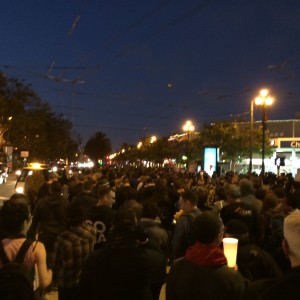A couple of weeks ago I posted a blog expressing general admiration, but a few reservations, about Tom Frank’s Listen Liberal.
Is it possible to remember labor without celebrating it? Is it possible to promote the right to education, health, security, and leisure without also promoting the right of capital to pave the path that makes these possible? When we celebrate FDR and the New Deal, do we also have to celebrate the industrial conditions that made the New Deal necessary?
I was barely a quarter into Tom’s book. And that was before the Brexit vote (the new “post 9-11”?).
I very much admire the way Frank dissects the Clinton and Obama presidencies, linking them to a misplaced faith in the well-graduated, professional managerial class and, more importantly, to the meritocratic, inno(vation) ideology used to justify wholesale privatization, deregulation, and elimination of the rights of working families. I also admire Frank’s midwestern Farm-Labor tinged perspective. Frank is from Kansas. I’m from Wisconsin. Both of us were raised in blue collar socialist-leaning, New Deal families. But both of us also earned our Ph.D’s in history from the anti-Ivy Ivy League university, Chicago.
If there is any institution in the US that believes in the power of ideas — not birth, legacy, lineage, entitlement, but — the power of ideas, it is Chicago, where the fact that your mom or dad or uncle graduated in “whenever” and contributed “whatever” to the endowment has exactly zero influence on whether you will be admitted. What matters is ideas. Period. And that is clear from Tom Frank’s shake-down of the liberal class. Guilty as charged.
At Chicago, therefore, no criticism is more biting or more feared than the accusation that your argument is “undertheorized.” The criticism that I need better or more complete data I can take. So too the criticism that I need greater specificity. But for my argument to be undertheorized! A fate worse than death itself. So Tom will know what I mean when I say that his argument is undertheorized. (This from the co-founder of the University of Chicago’s Social Theory Workshop.)
Let me be specific. I understand that working families endure a lot of hardship. I understand that they deserve a fair deal and that FDR gave them a fairer deal than the deal they were getting from Hoover. In The Wrecking Crew, Frank talks about the public service mentality of the civil servants who poured into Washington, DC after the war. My family arrived in DC in 1960 and remained until 1966, when my dad joined Robert McNamara in the exodus of the anti-war contingent from the Johnson administration. I can verify that when I returned to Washington as a lobbyist thirty-five years later the atmosphere was completely changed. I also understand and appreciate the distinction Frank invites us to draw between the Inno Democrats and the New Deal Democrats. As a lobbyist for biotech, I cannot point to anyone who was (a) not a Democrat; and (b) a supporter of organized labor. All of this fits. There is something big that the liberal class does not get. Two questions then: what do they not get? And why do they not get it?
Let me now propose a hypothesis. I believe that both the working class and the liberal class suffer from the same ailment. And let me drag out as my initial exhibit an unnecessarily blunt example (which we will then need to refine). All of those “best and brightest” folks JFK convinced to come to DC. Well Joe McCarthy was not all that delusional. Many, including my dad, if not closet members of the CPUSA, were sympathizers. That is to say, it was possible in the 1950s and 1960s to be both well-graduated and militantly pro-labor. I was born in 1957. My parents were not baseball fans and they named me Joe. ‘Nuff said.
At the same time, while the Teamsters and IWW were integrated, the same cannot be said for the AFL or even the CIO (who at least admitted blacks). The folks who beat on the heads of my older brother and sister in Chicago in 1968: they were not exceptions in the labor movement. Exceptions in the labor movement were the black sanitation workers in Memphis that Frank highlights. Yes, there were plenty of CPUSA sympathizers within the AFL and CIO. But the leadership was all red, white, and blue. Moreover, when it came time for the AFL-CIO leadership to send their kids to school, they sent them, every last one of them, to an Ivy. But this strongly suggests that the fulcrum on which this thesis turns — the well-graduated managerial professional liberal class on the one side and the working class on the other — fails to grasp something critical about the shift in social subjectivity that settled in after the war, by which I mean WWII.
Let us suppose for a moment that there is at least some truth in the analysis of, among others, Bob Jessop, David Harvey, Jeffry Frieden, Giovanni Arrighi and Robert Brenner that one of the big changes that settled in between 1944 and 1970 was that the US emerged in 1945, Bretton Woods (which established the World Bank, the IMF, and the World Trade Organization) under its belt, as the sole superpower. Japan and Germany were nowhere on the map. That was both the good news and the bad news, which is why both Presidents Truman and Eisenhower worked furiously to rebuild the economies of Germany and Japan. Who else would buy and consume our goods? And let us suppose that the towering success organized labor enjoyed from, say, 1932 to 1968 was in large measure due to the prodigous outlay of public taxpayer dollars, the largest in history, which it so happens was the price citizens had to pay to beat the Nazis and the Nationalists. Labor wins! And, yet, by 1968 Germany and Japan were back in the game so to speak and competition from their industries placed downward pressures on prices, which placed downward pressures on rates of return on investment — not only in the US, but also in Germany and Japan — which suggested that something needed to be done to avoid general financial collapse.
In all fairness, President Nixon tried. He tried to pass universal single-payer healthcare, but the UAW and therefore the Democrats objected because, it was argued, universal single-payer healthcare would weaken the union’s bargaining position with management. Nixon also tried to fund high-speed rail. But, again, the UAW saw rail travel as a substitution for the private automobile. The Democrats demurred. And so in 1971 President Nixon, out of options and not wishing to repeat the debacle of 1959, when President Eisenhower refused to devalue the Dollar and so (it is argued) delivered the margin for Kennedy’s victory — Nixon took the Dollar off the Gold Standard, let it float, and so provided that ephemeral bump to the economy that, it so happens, was scarcely needed in his trouncing of George McGovern by a landslide.
Of course, there is nothing particularly magical to currency devaluation. All of a sudden foreign goods are Dollar-expensive, domestic goods are Dollar-cheap. For a brief interval before equilibrium sets in, foreigners are buying US goods and factories enjoy a brief new lease on life. But, of course, there is the other side of the equation, where the demand for cheap US goods in Germany and Japan lead to deindustrialization and plant closures among our economic competitors, whose workers, now laid off, can no longer afford even US goods. And so a downward global cycle sets in. We call this global downturn the 1970s.
Some nations, most notably Sweden, Denmark, and Holland, had a ready answer to global stagnation. Simply accept lower returns on investment and spread the efficiencies generated by their economies more broadly. Everyone can do with slightly less. This solution clearly did not sit well with US investors, who demanded (and received) a fundamental shift in the regulatory regime. And while President Carter laid the groundwork for deregulating financial markets and eliminating burdensome taxes and regulations on private industry, President Reagan was the superhero who delivered formerly public interests into private hands.
I have no problem admitting that well-graduated Democrats played a role in the regulatory shift from labor-intensive industrial production to high-return “intellectual” financial instruments. Yet Frank completely overlooks the roles played by (1) the largest US Federal outlay in history to win WWII; (2) the complete destruction of the economies of our two leading competitors, Germany and Japan; and (3) the recovery of the Japanese and German economies in the late 1960s. Lord Keynes, it is true, famously lamented in 1932 how “there was no expenditure out of the proceeds of borrowing that it was thought proper for the State to incur except for war.” He hoped “that in the future we shall not adhere to this purist financial attitude, and that we shall be ready to spend on the enterprises of peace what the financial maxims of the past would only allow us to spend on the devastations of war.” That was in 1932. Yet, the fact is that it was WWII that generated not simply the unprecedented post-war boom, but also the accompanying growth of organized labor. No boom, no labor. Or, better. Maybe the US, like Germany and Italy or Spain adopts some form of extreme politics. My point is that big labor is as much a product of WWII as big capital.
The question is: what do we do in 1971? Germany and Japan are back in the game. We are past full employment and full industrial capacity. Any loosening of the currency will be inflationary. Constraining the currency will induce higher unemployment and economic contraction. Could we have followed the path of lower growth rates like Denmark, Holland, and Sweden? Theoretically, yes. Practically, no. Both labor and management, both working families and investors had grown accustomed to the boom brought on by WWII. Again, Lord Keynes: “I hope that in the future we shall not adhere to this purist financial attitude, and that we shall be ready to spend on the enterprises of peace what the financial maxims of the past would only allow us to spend on the devastations of war.” Good luck with that one.
At full employment and full industrial capacity, there was literally nothing the public could do to restore those luxurious 5-6% rates of return. It could not issue more currency. It could not lower interest rates. So, now what?
At this point, 1980, Frank wants labor to intervene; or he wants liberal intellectuals to intervene on labor’s behalf. And the truth is that the United Mine Workers and PATCO resisted heroically in the 1980s, but all to no avail. Because the regulatory regime had already shifted, begging the question: how does one earn returns on any current market? In the 1960s, investors earned returns by investing in labor. In the 1970s this was no longer clear. And in the 1980s it was absolutely clear that, in order to earn returns, investors should identify high-return financial instruments — i.e., not labor.
One way to inflect this problem is to conclude that the liberal class, the managerial professional class, the well-graduated class maliciously (yet successfully) maneuvered an end-run around their traditional allies, the working class. Another way to inflect this same problem, however, is to conclude that WWII was an anomaly. Lord Keynes was essentially right. We do, traditionally, only spend huge public sums on war. Those expenditures either completely destroy us — Germany and Japan — or they enrich us. But, traditionally, we are not inclined to spend such large sums of public moneys during times of peace. Perhaps we should. But we don’t. More importantly, when in the 1930s and 1940s these huge sums were spent on big labor, big labor emerged in 1945 more hostile to class analysis than a decade and a half earlier. Big Labor emerged in the 1950s and 1960s as the handmaid of Big Capital. And that was that. To find sympathizers with the CPUSA you actually had to look in government itself, to well-graduated, professional managerial midlevel operatives like my dad.
As a sidenote, dad eventually found himself coordinating radical feminist, immigrant, and worker movements in California during the 1980s, 90s, and 00s. My point, however, is that the neat division — working families versus the well-graduated — is woefully undertheorized. It fails to grasp what actually happened in the 1960s and 1970s.
Let us shift the discussion one notch. Is labor a form of oppression or is labor itself emancipatory? And, if it is oppressive, what does it oppress? What is the evidence of its oppression? I would argue that the overwhelming support for Brexit among working families in the UK is evidence of their oppression. But I would also argue that my colleagues’ incapacity to theorize through (or outside) of capitalism is also a variety of oppression. And I would argue that the simple institutional inertia of the global system; it too constitutes a form of oppression. Not workers versus well-graduated versus investors; but, what is this system in which all of us are contained? How does it work? Why does it work? Why do all of us — workers, intellectuals, investors — do its bidding? What social logic is at work here?
On on the final page of his book, Tom Frank offers the following practical advice:
What we can do is strip away the Democrats’ precious sense of their own moral probity— to make liberals live without the comforting knowledge that righteousness is always on their side. It is that sensibility, after all, that prevents so many good-hearted rank-and-file Democrats from understanding how starkly and how deliberately their political leaders contradict their values. Once that contradiction has been made manifest— once that smooth, seamless sense of liberal virtue has been cracked, anything becomes possible. The course of the party and the course of the country can both be changed, but only after we understand that the problem is us.
Frank, Thomas (2016-03-15). Listen, Liberal: Or, What Ever Happened to the Party of the People? . Henry Holt and Co.. Kindle Edition.
Again, I am sympathetic. There is no agent outside of us — no deus ex machina — that will fix this. We are it. Nevertheless, I do find it curious that the solution rests on “understanding,” an intellectual act. We deploy our minds and words to unsettle, disturb, “crack” the “moral probity” of the Democratic elite.
What’s wrong with that? Listen, liberal. There are a lot of things that minds are good at. However, when they fail at the very thing — methodological, theoretical and analytical rigor — at which they excel, then we know something is terribly wrong. Here is my theory. When minds are bent towards money, their thinking is skewed. There is nothing specially wrong with being well-graduated. There is nothing specially wrong with liking innovation. There is even nothing specially wrong with merit, so long as it is genuinely merited. But, as Aristotle noted over two and a quarter millennia ago, minds are bent and misshapen by money, so that they do not think clearly.
So, where was the error? Was it in the 2010s, when President Obama did all he could to hold a fragmented and fragmenting nation together? Was it in the 2000s, when President Bush did all he could to reward not merit, but wealth and greed? Was it in the 1990s, when President Clinton bent over backwards to prove that Democrats were the friends of financial markets? Was it the 1980s, when Presidents Reagan and Bush set about demolishing the social welfare state? Was it the 1970s, when Presidents Nixon, Ford, and Carter writ sold to the deed of Bretton Woods? Was it the 1950s and 60s when Presidents Kennedy, Johnson, and Nixon rode a war-time boom to its natural conclusion? Or was it the 1930s and 40s, when Presidents Roosevelt and Truman poured resources into war, which no US President has ever spent on peace?
And all along the way, with every step, the progressive working class and progressive intellectual class have marched in lock-step, for the most part. I think that what Frank is saying is, we, the liberal class, should know better precisely because we are smart. That is the mistake, I think. Minds are bent by capital. Thinking is skewed, not because it is evil or bad, but because it is real. The best thinking does not escape capital, but seeks to understand it. I am not sure Frank has succeeded.




